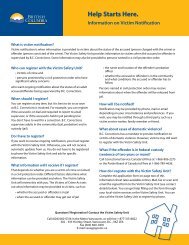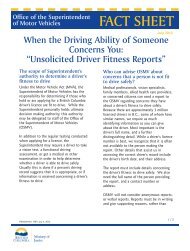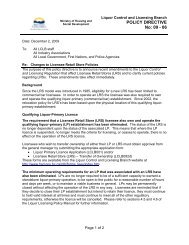- Page 1 and 2:
Ministry of Public Safety and Solic
- Page 3 and 4:
AcknowledgmentsResearcherBonnie M.
- Page 5 and 6:
Table of Contents (click on any ite
- Page 7 and 8:
11.7 Private and commercial drivers
- Page 9 and 10:
17.7 Private and commercial drivers
- Page 11 and 12:
20.8 Private and commercial drivers
- Page 13 and 14:
BACKGROUND ........................
- Page 15 and 16:
PART 1:BACKGROUND1
- Page 17 and 18:
Appendix 2: Excerpts from the MVA t
- Page 19 and 20:
Chapter 2: The Driver Fitness Progr
- Page 21 and 22:
for the exercise of discretion by O
- Page 23 and 24:
1. SCREENINGA driver disclosesa med
- Page 25 and 26:
2.3 Roles and responsibilitiesOSMV
- Page 27 and 28:
Medical practitionersMedical practi
- Page 29 and 30:
Chapter 3:Driver Fitness Program Pr
- Page 31 and 32:
Because of these limitations, OSMV
- Page 33 and 34:
Example: the temporary storage of i
- Page 35 and 36:
Motor functions (including sensorim
- Page 37 and 38:
an individual with poor contrast se
- Page 39 and 40:
3.5 Best informationDriver fitness
- Page 41 and 42:
Chapter 4: Introduction to the Poli
- Page 43 and 44:
3. DETERMINATIONFrom2. AssessmentAn
- Page 45 and 46:
Once identified, a DMER is mailed t
- Page 47 and 48:
5.3 Screening aging driversDefiniti
- Page 49 and 50:
5.5 Transient impairmentsDefinition
- Page 51 and 52:
Chapter 6: Assessment Policies and
- Page 53 and 54:
6.2 Assessments will only be reques
- Page 55 and 56:
6.4 Requesting specialist assessmen
- Page 57 and 58:
Policy6.5.1 If a case manager or ad
- Page 59 and 60:
Persistent and episodic impairments
- Page 61 and 62:
further assessment. Drivers who sco
- Page 63 and 64:
6.9.4 A case manager or adjudicator
- Page 65 and 66:
ASSESSMENT PROCEDURESCase manager o
- Page 67 and 68:
A driver fitness determination is a
- Page 69 and 70:
Policy rationaleBecause individuals
- Page 71 and 72:
7.5.3 Generally, an individual whos
- Page 73 and 74:
7.6.2 In particular, the case manag
- Page 75 and 76:
7.8.3 Whether an individual can com
- Page 77 and 78:
in order to be fit to drive, the ca
- Page 79 and 80:
has the judgment and willingness to
- Page 81 and 82:
Policy7.11.1 If a case manager or a
- Page 83 and 84:
(e) the medical condition results i
- Page 85 and 86:
7.12 Communicating a decisionPolicy
- Page 87 and 88:
7.13 Determination proceduresThe fo
- Page 89 and 90:
During the reconsideration, the adj
- Page 91 and 92:
8.3 Reconsideration proceduresThe f
- Page 93 and 94:
Chapter 9:Introduction to the Medic
- Page 95 and 96:
9.4 Medical condition chapter templ
- Page 97 and 98:
Private and commercial drivers who
- Page 99 and 100:
Chapter 11: Diabetes - Hypoglycemia
- Page 101 and 102:
PercentFigure 1 - Prevalence of Dia
- Page 103 and 104:
neuropathy, nephropathy, cardiovasc
- Page 105 and 106:
11.7 Private and commercial drivers
- Page 107 and 108:
11.8 Private drivers with diabetes
- Page 109 and 110:
11.9 Commercial drivers with diabet
- Page 111 and 112:
RestrictionsRe-assessmentguidelines
- Page 113 and 114:
Policy rationaleSevere hypoglycemia
- Page 115 and 116:
11.12 Private drivers who have pers
- Page 117 and 118:
11.13 Commercial drivers who have a
- Page 119 and 120:
11.14 Commercial drivers who have a
- Page 121 and 122:
11.15 Commercial drivers who have p
- Page 123 and 124:
PART B - HYPOGLYCEMIA11a. Has the p
- Page 125 and 126:
Produce my glycemic log for my doct
- Page 127 and 128:
Deep-vein thrombosisDeep-vein throm
- Page 129 and 130:
Aneurysms less than 5 cm in diamete
- Page 131 and 132:
GUIDELINES12.6 Private and commerci
- Page 133 and 134:
12.7 Private drivers who have an an
- Page 135 and 136:
12.9 Commercial drivers who have an
- Page 137 and 138:
Chapter 13: Musculoskeletal Conditi
- Page 139 and 140:
ConditionType of drivingimpairment
- Page 141 and 142:
GUIDELINES13.6 Private and commerci
- Page 143 and 144:
ConditionsRestrictionsRe-assessment
- Page 145 and 146:
14.3 Chronic renal disease and adve
- Page 147 and 148:
GUIDELINES14.6 Private and commerci
- Page 149 and 150:
14.8 Private drivers with end-stage
- Page 151 and 152:
14.10 Private and commercial driver
- Page 153 and 154:
Level ofImpairmentMildlyImpairedMod
- Page 155 and 156:
GUIDELINES15.6 Private and commerci
- Page 157 and 158:
15.8 Commercial drivers with modera
- Page 159 and 160:
15.10 Commercial drivers with sever
- Page 161 and 162:
Policy rationaleDrivers who require
- Page 163 and 164:
Chapter 16: Vestibular DisordersBAC
- Page 165 and 166:
One study identified that 32.5% of
- Page 167 and 168:
ConditionType ofdrivingimpairmentan
- Page 169 and 170:
Re-assessmentguidelinesPolicy ratio
- Page 171 and 172:
16.8 Private and commercial drivers
- Page 173 and 174:
16.10 Private and commercial driver
- Page 175 and 176:
Individuals who have undergone valv
- Page 177 and 178:
Episodic impairmentThe potential ep
- Page 179 and 180:
GUIDELINES17.6 Policy rationaleThes
- Page 181 and 182:
17.9 Commercial drivers with corona
- Page 183 and 184:
17.11 Private drivers who have had
- Page 185 and 186:
17.13 Private and commercial driver
- Page 187 and 188:
17.15 Private drivers who have vent
- Page 189 and 190:
17.17 Private and commercial driver
- Page 191 and 192:
17.19 Private drivers who have sust
- Page 193 and 194:
17.21 Commercial drivers who have s
- Page 195 and 196:
17.23 Private and commercial driver
- Page 197 and 198:
17.25 Private and commercial driver
- Page 199 and 200:
17.27 Private drivers with atrioven
- Page 201 and 202:
17.28 Commercial drivers with atrio
- Page 203 and 204:
17.29 Private drivers with permanen
- Page 205 and 206:
17.31 Private drivers who have decl
- Page 207 and 208:
17.33 Private drivers where ICD the
- Page 209 and 210:
17.35 Commercial drivers who have d
- Page 211 and 212:
17.37 Commercial drivers with inher
- Page 213 and 214:
17.39 Commercial drivers with medic
- Page 215 and 216:
17.41 Private drivers with surgical
- Page 217 and 218:
17.43 Private drivers with mitral v
- Page 219 and 220:
17.45 Private drivers with congesti
- Page 221 and 222:
17.46 Commercial drivers with conge
- Page 223 and 224:
17.47 Private drivers with left ven
- Page 225 and 226:
17.49 Private drivers with a heart
- Page 227 and 228:
17.51 Private drivers with hypertro
- Page 229 and 230:
17.53 SyncopeSee the guidelines in
- Page 231 and 232:
Stable coronary syndromes - waiting
- Page 233 and 234:
Chapter 18: Hearing LossBACKGROUND1
- Page 235 and 236:
GUIDELINES18.6 Private drivers with
- Page 237 and 238:
equirement for commercial drivers i
- Page 239 and 240:
PLEASE COMPLETE THE FOLLOWING: YES
- Page 241 and 242:
this manual. Axis IV addresses exte
- Page 243 and 244:
Negative symptoms are characterized
- Page 245 and 246:
Schizophrenia (Axis I)Schizophrenia
- Page 247 and 248:
19.4 Effect of psychiatric disorder
- Page 249 and 250:
Suicidal ideationSuicidal ideation
- Page 251 and 252:
GUIDELINES19.6 Private and commerci
- Page 253 and 254:
Chapter 20: Cerebrovascular Disease
- Page 255 and 256:
Cerebrovascular accidentCVAs are th
- Page 257 and 258:
ConditionType of drivingimpairment
- Page 259 and 260:
GUIDELINES20.6 Private and commerci
- Page 261 and 262:
Re-assessmentguidelinesPolicy ratio
- Page 263 and 264:
20.9 Private drivers who have had s
- Page 265 and 266:
20.10 Commercial drivers who have h
- Page 267 and 268:
Visual field impairment refers to a
- Page 269 and 270:
Right homonymous hemianopiaBinasal
- Page 271 and 272:
An example of the effects of diabet
- Page 273 and 274:
Retinitis pigmentosaRetinitis pigme
- Page 275 and 276:
GlaucomaApproximately 67 million pe
- Page 277 and 278:
indicates that wait times of 6 mont
- Page 279 and 280:
Although telescopic spectacles, hem
- Page 281 and 282:
Policy rationaleretinopathy dependi
- Page 283 and 284:
Policy rationaleIndividuals with be
- Page 285 and 286:
Re-assessmentguidelines cont’dPol
- Page 287 and 288:
Re-assessmentguidelines cont’dPol
- Page 289 and 290:
21.13 Commercial drivers with a los
- Page 291 and 292:
21.15 Private and commercial driver
- Page 293 and 294:
21.17 Visual field impairmentsTypes
- Page 295 and 296:
21.18 Examination of visual functio
- Page 297 and 298:
VISUAL FIELD TEST (VFT)For drivers
- Page 299 and 300: To the Driver:Under section 29 of t
- Page 301 and 302: Please note:Goldman, Esterman and H
- Page 303 and 304: Cardiac syncopeCardiac syncope refe
- Page 305 and 306: 22.7 Private drivers who have had a
- Page 307 and 308: 22.9 Private drivers with recurrent
- Page 309 and 310: 22.11 Commercial drivers who have h
- Page 311 and 312: 22.13 Commercial drivers with recur
- Page 313 and 314: Chapter 23: Seizures and EpilepsyBA
- Page 315 and 316: abnormal numbnesstingling and a cra
- Page 317 and 318: ConditionType of drivingimpairment
- Page 319 and 320: 23.8 Private and commercial drivers
- Page 321 and 322: 23.10 Private drivers with single u
- Page 323 and 324: 23.12 Private drivers with epilepsy
- Page 325 and 326: 23.14 Private drivers with epilepsy
- Page 327 and 328: 23.16 Private drivers with epilepsy
- Page 329 and 330: 23.18 Commercial drivers with epile
- Page 331 and 332: Level of disabilityor worsening of
- Page 333 and 334: Parkinson’s diseaseThere is a sma
- Page 335 and 336: ConditionType of drivingimpairment
- Page 337 and 338: ConditionsRestrictionsRe-assessment
- Page 339 and 340: 25.2 Prevalence and incidence of tr
- Page 341 and 342: GUIDELINES25.6 Private and commerci
- Page 343 and 344: Chapter 26: Intracranial TumoursBAC
- Page 345 and 346: Some examples of compensatory mecha
- Page 347 and 348: Re-assessmentguidelinesPolicy ratio
- Page 349: i. aphasia (language disturbance)ii
- Page 353 and 354: 27.4 Effect of cognitive impairment
- Page 355 and 356: Chapter 28: Sleep DisordersBACKGROU
- Page 357 and 358: An immediate reduction in daytime s
- Page 359 and 360: 28.5 CompensationIndividuals with s
- Page 361 and 362: OSMV determinationguidelines cont
- Page 363 and 364: ConditionsRestrictionsRe-assessment
- Page 365 and 366: Policy rationaleThe general approac
- Page 367 and 368: Chapter 29: Prescription and Over-T
- Page 369 and 370: Examples of newer antihistamines in
- Page 371 and 372: Stimulants (for ADHD)Examples of st
- Page 373 and 374: AntiepilepticsIn general, individua
- Page 375 and 376: Sedating EffectLowModerateHighTCAsd
- Page 377 and 378: dizziness, andblurred or double vis
- Page 379 and 380: Re-assessmentguidelinesPolicy ratio
- Page 381 and 382: 30.2 Effect of general debility and
- Page 383 and 384: 30.5 Private and commercial drivers
- Page 385 and 386: Appendix 1: Glossary of TermsCommer
- Page 387 and 388: Medical assessmentis any kind of as
- Page 389 and 390: Transient impairmentmeans a tempora
- Page 391 and 392: must cause to be issued to the appl
- Page 393 and 394: (ii) cancel the person's driver's l
- Page 395 and 396: Appendix 3: Aging DriversAbout agin
- Page 397 and 398: Percentadults. The survey also foun
- Page 399 and 400: Appendix 4: Licence ClassesThe tabl
- Page 401 and 402:
Appendix 5: Drafting and Approval P
- Page 403:
drivers, this means that BC commerc
















